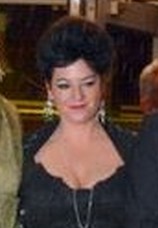Lynne Ramsay
| Lynne Ramsay | |
|---|---|

Ramsay at the 2013 Cannes Film Festival
|
|
| Born |
5 December 1969 Glasgow, Scotland, United Kingdom |
| Occupation | Film director, screenwriter, cinematographer |
| Years active | 1995–present |
| Spouse(s) | Rory Stewart Kinnear (m. 2002) |
Lynne Ramsay (born 5 December 1969) is a Scottish film director, writer, producer, and cinematographer best known for the feature films Ratcatcher, Morvern Callar and We Need to Talk about Kevin.
Lynne Ramsay's work bears a powerful personal imprint. Her films are marked by a fascination with children and young people and the recurring, unresolvable themes of grief, guilt and death and its aftermath. They are low on dialogue and explicit story exposition, and instead use images, vivid details, music and sound design to create their unsettling worlds. In April 2013 she was selected as a member of the main competition jury at the 2013 Cannes Film Festival. In 2015, she was named as a member of the Jury for the Main Competition at the 2015 Venice Film Festival.
Born in Glasgow on 5 December 1969, Ramsay graduated from the UK's National Film and Television School in 1995. She studied photography at Napier College, Edinburgh, then entered the National Film and Television School, where she specialised in cinematography and direction.
Ramsay took a break in-between Black and White Town and We Need to Talk About Kevin because of creative needs. As to her extended absence, the Scottish filmmaker explained that she thinks the film-making process is different for her, and other writer-directors, than it is for directors who don’t write their own material. The Harvard Film Archive welcomed Lynne Ramsay for a showcase of her films, including the three acclaimed shorts that inaugurated her career.
Ramsay experienced great personal frustration in her involvement with The Lovely Bones, during which personal and professional setbacks and mishandling saw her lose the job of directing to Peter Jackson, whose version of the film received largely negative reviews. She stated in an interview with Oliver Lyttelton that "People started to call it 'The Lovely Money,' they were getting greedy around it. And I could feel the vibes. It became like the Holy Bible, I kept handing in drafts and I thought they were good, but it was like 'But that's not exactly like the book, the book's going to be a success.' That was the mistake they made with the project." She stated additionally that she considered Jackson's interpretation of the film, with a desire to stick as closely as possible to the original story, was partially responsible for what she considered the lackluster quality of the finished product.
...
Wikipedia
